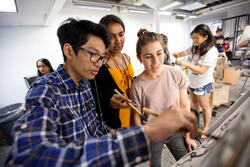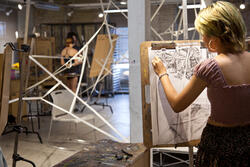RISD Pre-College
Image

Pre-College (on campus)
June 27–August 1, 2026
Live on campus or commute from home and immerse yourself in day-long studio classes, visits to the Nature Lab and RISD Museum, critiques, and projects that will forever shape the way you approach art and design.
Image

Pre-College Online
June 22–July 30, 2026
Be a RISD student from anywhere in the world, with live online classes two days a week and access to virtual resources and events.
Applications for summer 2026 open on November 5, 2025.
Image

Build your portfolio while developing as an artist and an individual
Expand your artistic comfort zone as you learn to appreciate critique and refine your work to make it stronger than you ever thought possible.
Image
